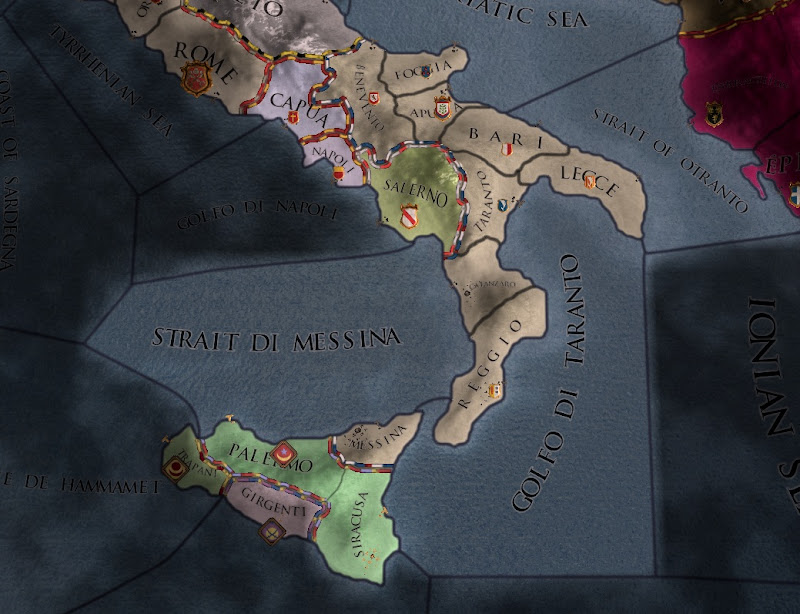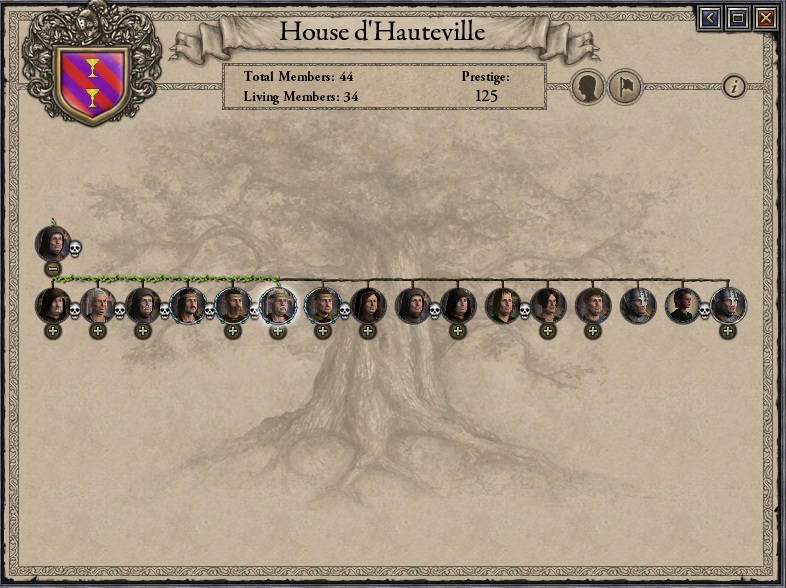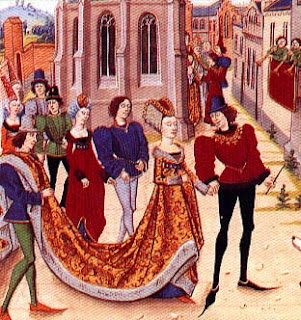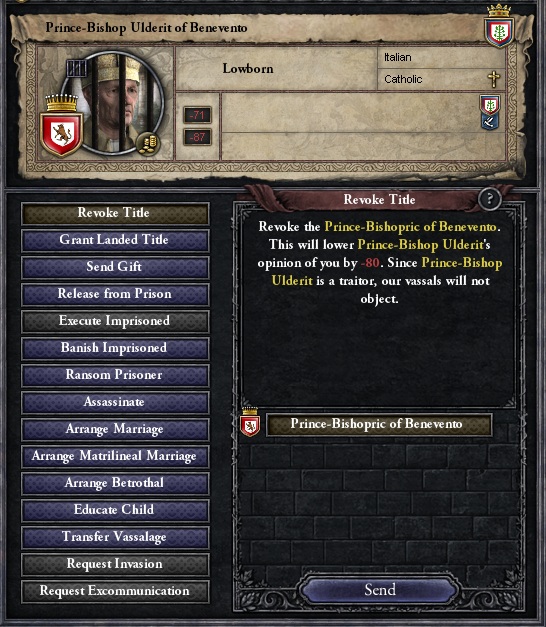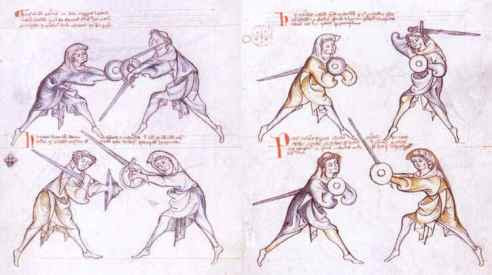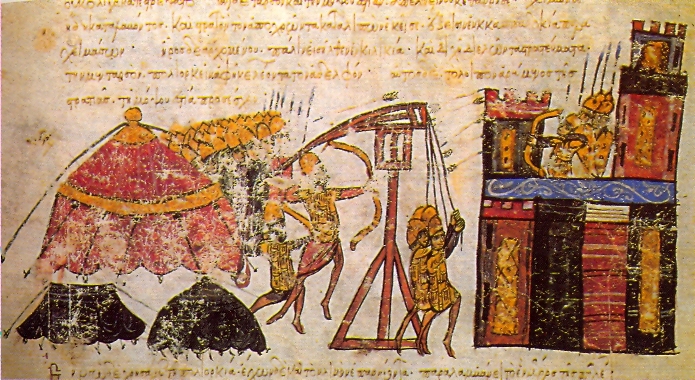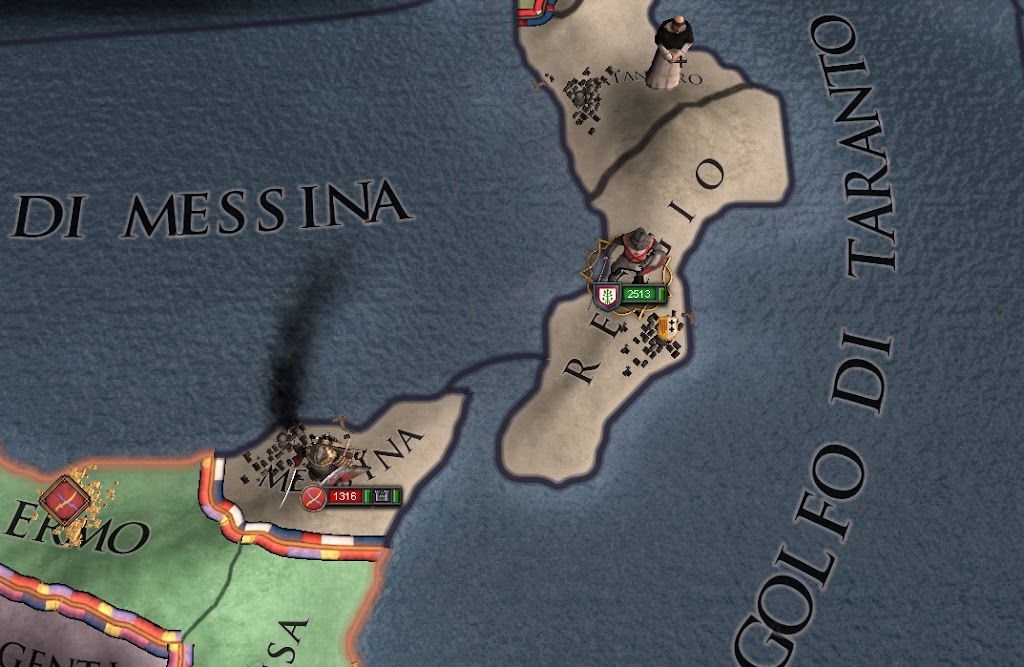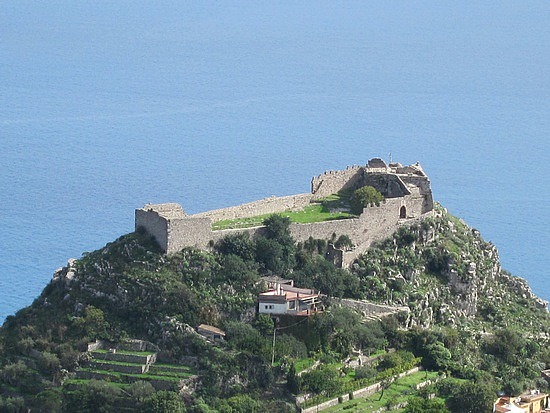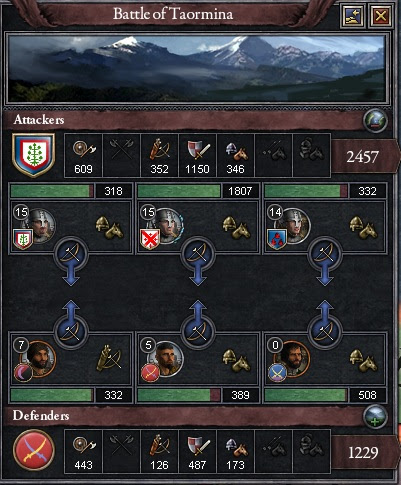Helloes and welcome!
This AAR is my first in quite a long time- so my writing might be a little rusty, my jokes a bit too bad (well, they were that before too) and I'm hoping you won't totally fall asleep when reading it!
Anyways, here is what I got. Don't expect updates too often, don't expect Shakespeare (but be prepared for occasional bad rhyme) and as for the style- I think i'll try to mix things up on this one.
Bear with me!
Duke Robert I de Hauteville, ruled 1057-1074
Foreword- Meet the Duke
Introduction to the Realm of Apulia
Early Politics
Holy War for Palermo, part I
Holy War for Palermo, part II
Late Years and Death of Robert I
King Bohemond I de Hauteville, ruled 1074-1115
Early Years of Bohemond
Interlude- Story of Bohemond and Maud
Final Conquest of Sicily
Interlude- Story of Thomas of Kent
Interlude- The Coronation of King Bohemond I
The Latter Years of Bohemond
King Robert I de Hauteville, ruled 1115-1126
King Robert, Part I
King Robert, Part II
Interlude- Siege of Leptis Magna
King Asclettin I de Hauteville, ruled 1126-1161
Early years of Asclettin
Interlude- How to Kill a Caliph?
The War with Caliphate, 1132-1138
The Calm Between Storm
Interlude- The Great Council
The Crusade for Galilee- the Beginning
The Crusade for Galilee- part 2
The Quieter Times
The Liberation of Jerusalem
Between Wars- Sicily in Peacetime
The War with Holy Roman Empire
Interlude- How to Die Like a King
Life and Death of King Asclettin- an overview
King Bohemond II de Hauteville, ruled 1161-1163
The Life and Death of King Bohemond II
Emperor Bohemond I de Hauteville, ruled 1161-1193
The Heavenly Kingdom, part 1
Interlude. The Heavenly Kingdom, part 2, the Coronation
Expansion of Sicily
The War with Holy Roman Empire, 1168-1169
Interlude- the Crusade
The Crusade for Jerusalem, part 1
The Crusade for Jerusalem, part 2- Seljuk Turks
The Crusade for Jerusalem, part 3- The End
War with Holy Roman Empire and Other Stuff
Go West
Four Wars and Some Funerals
What's so Civil About War Anyway?
Holy Wars are True Wars!
Coronation of Emperor Bohemond I
Canonical Disputes
You Live By the Sword, You Die By the Sword
The Life and Death of Emperor Bohemond I- an overview
Emperor Bohemond II de Hauteville, ruled 1193-1197
Three Wars and a Funeral
Emperor Turquetil I de Hauteville, ruled 1197-1244
Growing up
Interlude- Ch-ch-changes
The New Religion
Internal Affairs and Crossing the Adriatic Straight
The Crusade for Jerusalem
This Means Holy War, part 1
Interlude- The Battle of Ronda
This Means Holy War, part 2
The Empire Strikes Back on the Other Empire
Back to the East
The Fall of Kingdom of Croatia
East and West or the Holy Order Hat-Trick
The Kingdom of Portugal
The Empire Strikes Back on the Other, Slightly More Evil Empire part 2
Interlude: The Story of Demir ve Tahta
The City of Man’s Desire
The Queen and the Duchess (and of course, some Normans)
Stabbing in the Back and Other Wars
To War with the Kaiser in the Name of Free France
Two Mistakes of Kaiser Leopold
And the Wars Go on
Norman Coronation Gift to New Kaiser
Last War of Turquetil
Life and Death of Emperor Turquetil I, part I
Life and Death of Emperor Turquetil I, part II
Life and Death of Emperor Turquetil I, part III
Emperor Robert I Guiscard de Hauteville the Syphilic, ruled 1244-1245
End of Robert I Guiscard The Syphilic
Augusta Adelise I, ruled 1245-1304
Adelise Begins her Rule
Aragon and Castille
Norman Invasion of Normandy
Traditional Coronation Gift to the Kaiser
Byzantine Adventures
Kingdom of Aquitaine
Bretons and Holy Orders
Coming Home. Semi-interlude.
Like Taking a Duchy from a Baby
Two Wars and a Mysterious Death
Last Duchy of Italy
Back to Iberia and Other Matters
Free Trade Zone of Ireland
Quest for Albion
Interlude- Changes to the Empire
The Scotland is a Mess
Norman Greece
Quest for the Mediterranean
Doomstacks on Horizon, Part I
Doomstacks on Horizon, Part II- the Battle of Kairy
Doomstacks on Horizon, Part III
Fighting for the Catharism. Kind of..
Anarchy in the UK
Attack on the Holy Roman Empire
Ripping Apart Hungary
Semi-interlude. From Mercenaries to Ceasars
Catharism, Children, Excecutions and Alps
Lost Lambs
More of Europe, Please
Germans and French
Blood in the Pusztas, Part I
Blood in the Pusztas, Part II
Revenge on the Mongols
Mare Nostrum
Thus, the Empress Departs
Life and Death of Augusta Adelise
Augustus Sayer I, ruled 1304- 1349
Sayer and the Holy Roman Empire
Bring Out Your Dead- Interlude
End of Leon
The Flood, part 1- Normans are Coming
The Flood, part 2- To the Baltic Sea
The Flood, part 3- Clearing out Pawns
The Flood, part 4- Away with Mongols
The Flood, part 5- The Norse Lands
The Flood, part 6- Pushing into North
The Flood, part 7- The Flood Becomes a Trickle
Killing Kaisers
Jihad and Holy War for Mesopotamia
Interlude: The Rise and Fall of the Holy Roman Empire
Picking up the Pieces
Do Not Poke the Sleeping Dragon
The Great Northwen War(s), Part I
The Great Northern War(s), Part II
New Traditions
Quiet Times
To the Unknown Seas!
To the Eastern Edge of the Known World
Yet Another Sea
End of the Golden Horde
End of the Badai Dynasty
How To Kill Khagan(s)- a Picture Book
Whack-a-Mongol
The Last Kingdom
You Live by the Knife, You Die by the Knife.
Life and Death of Augustus Sayer
Augustus Joscelin I, ruled 1349-?
No One Can Stop the Norman Invasion
Short History of de Hautevilles
This AAR is my first in quite a long time- so my writing might be a little rusty, my jokes a bit too bad (well, they were that before too) and I'm hoping you won't totally fall asleep when reading it!
Anyways, here is what I got. Don't expect updates too often, don't expect Shakespeare (but be prepared for occasional bad rhyme) and as for the style- I think i'll try to mix things up on this one.
Bear with me!
Duke Robert I de Hauteville, ruled 1057-1074
Foreword- Meet the Duke
Introduction to the Realm of Apulia
Early Politics
Holy War for Palermo, part I
Holy War for Palermo, part II
Late Years and Death of Robert I
King Bohemond I de Hauteville, ruled 1074-1115
Early Years of Bohemond
Interlude- Story of Bohemond and Maud
Final Conquest of Sicily
Interlude- Story of Thomas of Kent
Interlude- The Coronation of King Bohemond I
The Latter Years of Bohemond
King Robert I de Hauteville, ruled 1115-1126
King Robert, Part I
King Robert, Part II
Interlude- Siege of Leptis Magna
King Asclettin I de Hauteville, ruled 1126-1161
Early years of Asclettin
Interlude- How to Kill a Caliph?
The War with Caliphate, 1132-1138
The Calm Between Storm
Interlude- The Great Council
The Crusade for Galilee- the Beginning
The Crusade for Galilee- part 2
The Quieter Times
The Liberation of Jerusalem
Between Wars- Sicily in Peacetime
The War with Holy Roman Empire
Interlude- How to Die Like a King
Life and Death of King Asclettin- an overview
King Bohemond II de Hauteville, ruled 1161-1163
The Life and Death of King Bohemond II
Emperor Bohemond I de Hauteville, ruled 1161-1193
The Heavenly Kingdom, part 1
Interlude. The Heavenly Kingdom, part 2, the Coronation
Expansion of Sicily
The War with Holy Roman Empire, 1168-1169
Interlude- the Crusade
The Crusade for Jerusalem, part 1
The Crusade for Jerusalem, part 2- Seljuk Turks
The Crusade for Jerusalem, part 3- The End
War with Holy Roman Empire and Other Stuff
Go West
Four Wars and Some Funerals
What's so Civil About War Anyway?
Holy Wars are True Wars!
Coronation of Emperor Bohemond I
Canonical Disputes
You Live By the Sword, You Die By the Sword
The Life and Death of Emperor Bohemond I- an overview
Emperor Bohemond II de Hauteville, ruled 1193-1197
Three Wars and a Funeral
Emperor Turquetil I de Hauteville, ruled 1197-1244
Growing up
Interlude- Ch-ch-changes
The New Religion
Internal Affairs and Crossing the Adriatic Straight
The Crusade for Jerusalem
This Means Holy War, part 1
Interlude- The Battle of Ronda
This Means Holy War, part 2
The Empire Strikes Back on the Other Empire
Back to the East
The Fall of Kingdom of Croatia
East and West or the Holy Order Hat-Trick
The Kingdom of Portugal
The Empire Strikes Back on the Other, Slightly More Evil Empire part 2
Interlude: The Story of Demir ve Tahta
The City of Man’s Desire
The Queen and the Duchess (and of course, some Normans)
Stabbing in the Back and Other Wars
To War with the Kaiser in the Name of Free France
Two Mistakes of Kaiser Leopold
And the Wars Go on
Norman Coronation Gift to New Kaiser
Last War of Turquetil
Life and Death of Emperor Turquetil I, part I
Life and Death of Emperor Turquetil I, part II
Life and Death of Emperor Turquetil I, part III
Emperor Robert I Guiscard de Hauteville the Syphilic, ruled 1244-1245
End of Robert I Guiscard The Syphilic
Augusta Adelise I, ruled 1245-1304
Adelise Begins her Rule
Aragon and Castille
Norman Invasion of Normandy
Traditional Coronation Gift to the Kaiser
Byzantine Adventures
Kingdom of Aquitaine
Bretons and Holy Orders
Coming Home. Semi-interlude.
Like Taking a Duchy from a Baby
Two Wars and a Mysterious Death
Last Duchy of Italy
Back to Iberia and Other Matters
Free Trade Zone of Ireland
Quest for Albion
Interlude- Changes to the Empire
The Scotland is a Mess
Norman Greece
Quest for the Mediterranean
Doomstacks on Horizon, Part I
Doomstacks on Horizon, Part II- the Battle of Kairy
Doomstacks on Horizon, Part III
Fighting for the Catharism. Kind of..
Anarchy in the UK
Attack on the Holy Roman Empire
Ripping Apart Hungary
Semi-interlude. From Mercenaries to Ceasars
Catharism, Children, Excecutions and Alps
Lost Lambs
More of Europe, Please
Germans and French
Blood in the Pusztas, Part I
Blood in the Pusztas, Part II
Revenge on the Mongols
Mare Nostrum
Thus, the Empress Departs
Life and Death of Augusta Adelise
Augustus Sayer I, ruled 1304- 1349
Sayer and the Holy Roman Empire
Bring Out Your Dead- Interlude
End of Leon
The Flood, part 1- Normans are Coming
The Flood, part 2- To the Baltic Sea
The Flood, part 3- Clearing out Pawns
The Flood, part 4- Away with Mongols
The Flood, part 5- The Norse Lands
The Flood, part 6- Pushing into North
The Flood, part 7- The Flood Becomes a Trickle
Killing Kaisers
Jihad and Holy War for Mesopotamia
Interlude: The Rise and Fall of the Holy Roman Empire
Picking up the Pieces
Do Not Poke the Sleeping Dragon
The Great Northwen War(s), Part I
The Great Northern War(s), Part II
New Traditions
Quiet Times
To the Unknown Seas!
To the Eastern Edge of the Known World
Yet Another Sea
End of the Golden Horde
End of the Badai Dynasty
How To Kill Khagan(s)- a Picture Book
Whack-a-Mongol
The Last Kingdom
You Live by the Knife, You Die by the Knife.
Life and Death of Augustus Sayer
Augustus Joscelin I, ruled 1349-?
No One Can Stop the Norman Invasion
Short History of de Hautevilles
Last edited:





